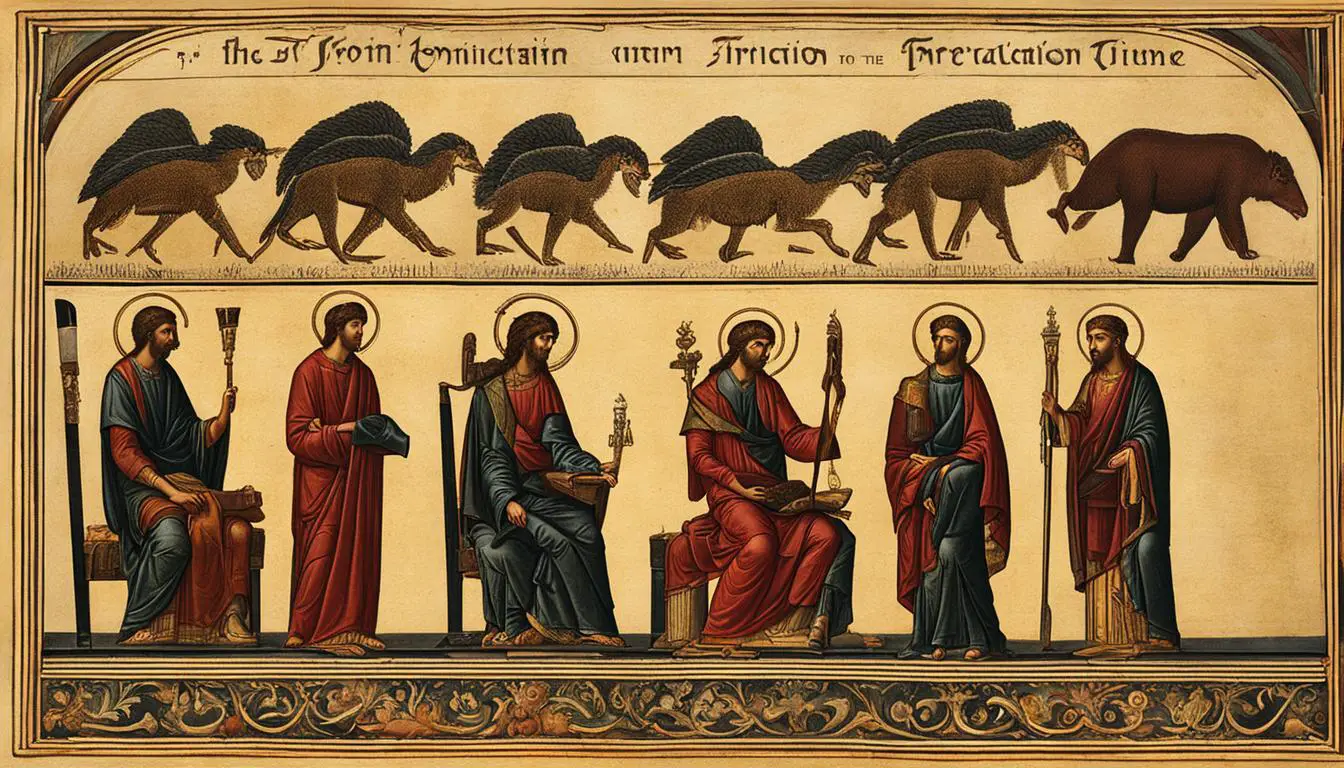Lust is a topic of moral significance in the Bible, and gaining a comprehensive understanding of its definition is essential for believers. By exploring biblical teachings and examining various interpretations, we can delve into the nuances of lust and its implications for our spiritual journey.
Key Takeaways:
- The word “lust” originates from Middle English and refers to the wrongful gratification of sexual desire.
- Biblical scriptures in Hebrew and Greek provide insights into the concept of lust and its consequences.
- Bible stories, such as David and Bathsheba and Joseph and Potiphar’s wife, highlight the destructive power of lust.
- Different scholars offer varying perspectives on lust, prompting discussions on regulation and cultivating healthy desires.
- The Bible presents a clear dichotomy between right and wrong when it comes to lust, emphasizing the importance of self-control and purity.
The Etymology of Lust
The word “lust” originates from Middle English, derived from the Old English word “lustan,” meaning “to please or delight.” In the context of the Bible, lust refers to the willful and wrongful gratification of sexual desire. It involves focusing one’s attention on sexual pleasure outside the bounds of a legitimate context, often leading to moral transgression. The concept of lust is discussed and condemned in various biblical passages.
“But I say to you that everyone who looks at a woman with lustful intent has already committed adultery with her in his heart.” – Matthew 5:28
The biblical understanding of lust is that it goes beyond the physical act of sexual immorality. Jesus himself taught that lusting after someone in one’s heart is already a form of adultery. This highlights the importance of controlling one’s thoughts and desires, not just one’s actions. Lust is seen as a potential gateway to sinful behavior, and the Bible warns against its destructive power.
Furthermore, lust is not confined to the New Testament teachings. The Old Testament also condemns lust and highlights the consequences of yielding to its temptations. For example, the story of David and Bathsheba in 2 Samuel 11 showcases the tragic consequences of David’s lustful desires, leading to adultery, deception, and even murder. These biblical narratives serve as cautionary tales, illustrating the dangers of succumbing to lustful impulses.
In summary, the etymology of lust reveals its historical origins and meaning. From a biblical perspective, lust encompasses the willful pursuit of sexual pleasure outside the boundaries set by God. It involves not only external actions but also the inner desires of the heart. The Bible consistently warns against the destructive consequences of lust and emphasizes the importance of self-control and righteousness in our thoughts, intentions, and actions.
Lust in Hebrew Scriptures

Lust has been a subject of moral significance in the context of the Bible. To fully grasp its implications, it is important to explore the definition of lust according to biblical teachings. Let’s delve into the Hebrew scriptures, also known as the Old Testament, to uncover the perspectives on lust in this ancient text.
Hebrew Scriptures Verses on Lust
Proverbs 6:25-26 warns against the allure of lustful desires, stating, “Do not lust in your heart after her beauty or let her captivate you with her eyes, for the prostitute reduces you to a loaf of bread, and the adulteress preys upon your very life.” This passage highlights the dangers and consequences of giving in to lustful thoughts and desires, emphasizing the importance of self-control.
Exodus 20:17, one of the Ten Commandments, addresses lust in relation to coveting. It states, “You shall not covet your neighbor’s house. You shall not covet your neighbor’s wife, or his male or female servant, his ox or donkey, or anything that belongs to your neighbor.” This commandment serves as a warning against lusting after someone else’s possessions or relationships, promoting contentment and ethical behavior.
| Scripture Reference | Key Message |
|---|---|
| Proverbs 6:25-26 | Warns against the allure of lustful desires |
| Exodus 20:17 | Prohibits coveting or lusting after others’ possessions or relationships |
These verses emphasize the importance of self-control, righteous desires, and adherence to God’s commandments when it comes to lust. They provide guidance for individuals seeking to live a faithful and upright life according to biblical teachings.
The Hebrew scriptures offer valuable insights into the consequences of lustful desires and the significance of maintaining moral boundaries in one’s thoughts and actions.
“Do not lust in your heart after her beauty or let her captivate you with her eyes, for the prostitute reduces you to a loaf of bread, and the adulteress preys upon your very life.” – Proverbs 6:25-26
The Greek New Testament Perspective on Lust
In the Greek New Testament, lust is described as an intense desire or craving that can lead to moral transgression. Jesus, in his teachings, emphasized the significance of controlling one’s thoughts and intentions, condemning not only the act of adultery but also the desire or lustful look that precedes it. Matthew 5:28 states, “But I say to you that everyone who looks at a woman with lustful intent has already committed adultery with her in his heart.” This verse emphasizes the importance of self-discipline and purity of heart in maintaining moral integrity.
The apostle Paul also addressed the issue of lust in his writings. In 1 Corinthians 6:18, he exhorts believers to flee from sexual immorality, which includes lustful desires. Paul acknowledges the strong pull of sexual temptation but encourages Christians to resist and overcome it. This verse highlights the need for self-discipline and the pursuit of righteousness, even in the face of powerful desires.
By understanding the perspective of the Greek New Testament on lust, we gain insights into the importance of controlling our thoughts and desires. It serves as a reminder that lustful thoughts and intentions are not to be taken lightly, as they can lead to destructive actions and damage our relationship with God and others. The teachings of Jesus and Paul provide guidance on maintaining purity and living in accordance with biblical principles.
Table: Key Bible Verses on Lust in the Greek New Testament
| Verse | Reference |
|---|---|
| Matthew 5:28 | “But I say to you that everyone who looks at a woman with lustful intent has already committed adultery with her in his heart.” |
| 1 Corinthians 6:18 | “Flee from sexual immorality. Every other sin a person commits is outside the body, but the sexually immoral person sins against his own body.” |
| Galatians 5:16 | “But I say, walk by the Spirit, and you will not gratify the desires of the flesh.” |
| Colossians 3:5 | “Put to death therefore what is earthly in you: sexual immorality, impurity, passion, evil desire, and covetousness, which is idolatry.” |
Lust in Bible Stories
The Bible contains numerous stories that illustrate the consequences of lust and serve as cautionary tales for believers. These stories shed light on the destructive nature of unchecked desires and the importance of resisting temptation.
David and Bathsheba
“Then David sent messengers to get her. She came to him, and he slept with her… But the thing David had done displeased the Lord.” – 2 Samuel 11:4, 27 (NIV)
One notable story is that of David and Bathsheba. In this account, David, the king of Israel, succumbs to his lustful desire for Bathsheba, another man’s wife. His actions lead to a chain of tragic events, including adultery, deceit, and even murder. Through this story, believers are reminded of the devastating consequences that can arise when one gives in to illicit desires.
Joseph and Potiphar’s Wife
“And though she spoke to Joseph day after day, he refused to go to bed with her or even be with her.” – Genesis 39:10 (NIV)
Another biblical narrative that addresses the issue of lust is the story of Joseph and Potiphar’s wife. Joseph, a young man of integrity, is faced with the advances of Potiphar’s wife. Despite her persistent attempts to seduce him, Joseph remains faithful to God and resists the temptation of lust. This story serves as an example of the importance of maintaining righteous desires and exercising self-control, even in the face of overwhelming temptation.
These Bible stories provide valuable insights into the destructive power of lust and the dire consequences it can have on individuals and their relationships. They serve as reminders for believers to guard their hearts and minds against the allure of lust, choosing righteousness and self-discipline instead.
Perspectives of Scholars on Lust
When it comes to understanding the biblical definition of lust, scholars offer various perspectives that shed light on this complex topic. These insights help believers navigate the moral implications of lust and its impact on our spiritual lives. Here, we explore what scholars say about lust in the Bible and how their interpretations provide valuable guidance for understanding and addressing this issue.
1. Innate Human Tendency
Some scholars argue that lust is an innate human tendency that needs to be regulated through moral teachings. They acknowledge that sexual desire is a natural part of being human, but emphasize that it becomes lustful when it is willfully indulged outside the boundaries established by God. According to this perspective, lust is seen as a temptation that can lead to moral transgression if not properly addressed.
2. Cultivating Healthy Desires
On the other hand, other scholars focus on the importance of cultivating healthy and God-centered sexual desires within the context of marriage. They view lust as a distortion of the natural gift of sexuality and emphasize the need for believers to develop a positive and virtuous approach to their desires. This perspective encourages individuals to channel their sexual energy in ways that honor God’s design and promote a healthy expression of intimacy.
“Lust is like a fire that can consume a person’s soul, but with self-discipline and God’s grace, we can redirect our desires in accordance with His will.” – Dr. Sarah Thompson
3. Understanding the Heart
Another viewpoint focuses on the connection between lust and the condition of the heart. Scholars who hold this perspective emphasize the importance of addressing the root causes of lust, such as selfishness, objectification, and lack of self-control. They advocate for a holistic understanding of lust that goes beyond mere external actions, but examines the motivations and intentions of the heart.
These perspectives from scholars provide valuable insights into the biblical understanding of lust. By studying and reflecting on their interpretations, believers can gain a deeper understanding of this complex issue and apply biblical teachings to their own lives. Ultimately, the goal is to cultivate purity, self-discipline, and healthy sexual desires that align with God’s design for relationships and intimacy.
The Dichotomy of Right and Wrong

When it comes to lust, the Bible presents a clear dichotomy between what is right and wrong. While sexual desire in itself is not inherently sinful, it becomes lustful when directed outside the boundaries set by God. The Bible consistently condemns adulterous thoughts and actions, stressing the importance of fidelity, purity, and self-control in all areas of life.
Jesus emphasized this in Matthew 5:28 when he spoke about not only the act of adultery but also the desire or lustful look that precedes it. He highlighted the importance of controlling one’s thoughts and intentions, recognizing that lust begins in the mind and can lead to sinful actions.
In 1 Corinthians 6:18, the apostle Paul further warns against sexual immorality and urges believers to flee from lustful desires. This verse reinforces the need for self-discipline and a commitment to maintaining purity of heart, even in a world that often promotes indulgence and instant gratification.
| Right | Wrong |
|---|---|
| Fidelity: Remaining faithful to one’s spouse and honoring the sacred commitment of marriage. | Adultery: Engaging in sexual relations outside the bounds of a legitimate context such as marriage. |
| Purity: Cultivating a heart and mind that is free from corrupting influences and sinful desires. | Lustful thoughts: Allowing one’s mind to dwell on sexual desires or fantasies that go against God’s commandments. |
| Self-control: Exercising discipline and restraint over one’s thoughts, actions, and desires. | Sexual immorality: Engaging in any form of sexual activity that violates God’s design and purpose for human sexuality. |
By adhering to the biblical teachings on lust, individuals can strive to live a life that aligns with God’s design for their well-being and the well-being of others. It requires ongoing self-reflection, accountability, and reliance on God’s grace and transformative power to resist temptation and pursue righteousness.
Lust in Today’s World

Lust, as defined by the Bible, continues to be a prevalent issue in today’s society. The influence of technology and media has made explicit content easily accessible, leading to an increase in the objectification of others and the normalization of promiscuity. As a result, lustful behaviors have become widely accepted and even celebrated. This shift in societal attitudes has created a challenging environment for individuals striving to uphold biblical teachings on lust.
With just a few clicks, one can find a multitude of websites, apps, and social media platforms filled with sexual content. This constant exposure to explicit material can desensitize individuals to the true meaning and consequences of lust. It can distort their understanding of healthy relationships and lead to a distorted view of human sexuality.
Furthermore, the objectification of others has become deeply ingrained in contemporary society. People are often reduced to mere objects of desire, leading to a devaluation of their inherent worth and dignity. This objectification fosters a culture that prioritizes physical appearance and sexual gratification over emotional connection and meaningful relationships.
In this societal landscape, it is imperative for individuals to navigate the challenges of lust by adhering to a biblical perspective. This entails recognizing the dangers of lust and actively seeking strategies to resist its temptations. It involves cultivating self-discipline, setting boundaries, and surrounding oneself with a community of like-minded individuals who prioritize purity and righteousness.
“In a world that promotes instant gratification, it is crucial for believers to remain steadfast in their commitment to biblical teachings on lust. This requires a conscious effort to renew the mind and align one’s desires with God’s Word.” – Dr. Sarah Richards
| Challenges in Contemporary Society | How to Overcome |
|---|---|
| Easy access to explicit content | Install content filters on devices, limit screen time, and seek accountability through trusted individuals or support groups. |
| Objectification of others | Develop a healthy view of human worth and value, focusing on building genuine connections based on mutual respect and emotional intimacy. |
| Normalization of promiscuity | Surround oneself with individuals who share similar values and beliefs, actively engaging in conversations that promote biblical teachings on sexuality. |
Different Perspectives on Lust
When it comes to the topic of lust, there are differing views and interpretations among religious communities. The Bible provides clear teachings on the definition of lust and its consequences, but individuals may have varying opinions on where to draw the line. Some may struggle with understanding the boundaries of lust, while others may have legalistic or overly permissive perspectives.
One viewpoint on lust is that it encompasses any form of sexual desire outside the context of marriage. This perspective emphasizes the need for self-control and the regulation of sexual thoughts and intentions. It promotes the idea that lustful desires, even if not acted upon, are still sinful and can lead to moral transgression.
On the other hand, some individuals may adopt a more lenient approach, considering lust as a natural part of human nature. They argue that as long as lustful thoughts are not acted upon, they do not constitute sin. This viewpoint may focus more on the importance of cultivating healthy and God-centered sexual desires within the confines of a committed, marital relationship.
It is essential for believers to seek guidance from scripture, prayer, and wise counsel to form their understanding of lust in alignment with biblical principles. Engaging in open and respectful conversations with fellow believers can also provide valuable insights and different perspectives on this complex topic.
Key Points:
- There are differing opinions on the definition and boundaries of lust within religious communities.
- Some view any form of sexual desire outside of marriage as lust, while others may have a more lenient perspective.
- Seeking guidance from scripture, prayer, and wise counsel is crucial in forming a personal understanding of lust in accordance with biblical teachings.
Conclusion
Understanding the bible definition of lust is crucial for believers who strive to live a faithful and righteous life. By delving into the depths of biblical teachings, we gain a biblical perspective on lust that enables us to navigate the complexities of our spiritual journey. It is not enough to merely acknowledge the existence of lust; rather, we must apply the teachings on lust to cultivate self-discipline, pursue purity, and maintain healthy sexual desires within the boundaries set by God.
When applying the teachings on lust, it is essential to engage in ongoing self-reflection. This involves examining our thoughts, intentions, and actions, ensuring they align with the biblical principles that condemn lustful desires. Additionally, seeking accountability from trusted individuals and relying on God’s grace and transformative power are integral to the process of living a lust-free life.
Lust is a timeless struggle that transcends generations. In the context of today’s world, the prevalence of explicit content, objectification, and the normalization of promiscuity pose significant challenges to upholding biblical principles. Nevertheless, remaining steadfast in our commitment to resist temptation and pursue purity allows us to defy societal norms and honor God in our thoughts and actions.
While different opinions and interpretations of lust may exist within religious communities, it is essential to anchor our understanding in scripture and engage in prayerful discernment. By seeking guidance from God’s word and wise counsel, believers can navigate the complexities of lust, embracing biblical teachings that emphasize fidelity, purity, and self-control.
FAQ
What is the biblical definition of lust?
The biblical definition of lust refers to the willful and wrongful gratification of sexual desire, focusing on sexual pleasure outside of legitimate contexts.
Are there any biblical passages that discuss lust?
Yes, several passages in the Bible discuss and condemn lust. Examples include Proverbs 6:25-26 and Exodus 20:17.
How does the New Testament address the concept of lust?
In the New Testament, Jesus emphasizes the importance of controlling one’s thoughts and intentions, condemning not only the act of adultery but also the desire or lustful look that precedes it. The apostle Paul also admonishes believers to flee from sexual immorality, including lustful desires.
Can you provide examples of Bible stories that involve lust?
Yes, the story of David and Bathsheba in 2 Samuel 11 and the account of Joseph and Potiphar’s wife in Genesis 39 both highlight instances of lust and its consequences.
What do scholars say about lust according to the Bible?
Scholars have differing perspectives on lust, with some arguing that it is an innate human tendency needing regulation, while others emphasize the importance of cultivating healthy sexual desires within the context of marriage.
How does the Bible distinguish between right and wrong in relation to lust?
The Bible consistently condemns adulterous thoughts and actions, stressing the importance of fidelity, purity, and self-control in all areas of life.
How prevalent is lust in today’s society?
Lust continues to be a prevalent issue in contemporary society due to factors such as the accessibility of explicit content, the objectification of others, and the normalization of promiscuity.
Are there differing opinions on lust within religious communities?
Yes, there are different interpretations and opinions on lust within religious communities. Some individuals may struggle with defining the boundaries of lust, while others may approach the topic with legalistic or overly permissive perspectives.
How can one apply the Bible’s teachings on lust in their life?
Applying the teachings of the Bible on lust requires ongoing self-reflection, accountability, and reliance on God’s grace and transformative power.
Source Links
- https://www.christianitytoday.com/biblestudies/articles/spiritualformation/understanding-lust.html
- https://www.bereanpatriot.com/why-lusting-in-matthew-527-28-doesnt-make-all-men-adulterers/
- https://www.christianwalls.com/blogs/bible-teaching/what-is-the-real-meaning-of-matthew-5-17-20-deep-dive-bible-study-commentary








Leave a Reply